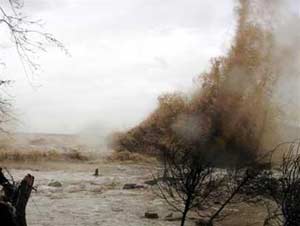Global temperatures rise, what will happen?
Scientists around the world have warned that global temperatures are rising and if countries do not take drastic measures, the consequences will be incalculable.

Strong storms accompanied by rising sea levels are a consequence of global warming (photo of storm No. 7 in 2005)
Talking to Tuoi Tre , Mr. Le Nguyen Tuong - Head of Department of Science, Training and International Cooperation, Institute of Meteorology and Hydrology - said:
- Most greenhouse gases are long-lasting natural gas and an important component in the atmosphere. These gases are capable of radiating and reflecting long waves of glass-cage solar radiation and they are called greenhouse gases.
Thanks to greenhouse gases with stable concentrations in the atmosphere, the Earth's climate is as warm as it is today with the life of all species. The average temperature of the Earth's surface is about 15 o C.
However, along with the development of science and technology, economic development, especially the explosion of the industrial revolution, people have added a huge amount of gases to the atmosphere. The artificial greenhouse effect significantly changes the concentration of greenhouse gases, changing the atmosphere's ability to absorb and reflect radiation, increasing the greenhouse effect. The corollary is to lead to an increase in the temperature of the Earth's surface.
How will global temperatures rise in the future, sir?
- The latest research and calculations of the Intergovernmental Organization on Climate Change show that by 2100, the surface temperature of the Earth can increase by 1.4 - 5.8 o C. The ground temperature increases. faster than the sea surface, the northern hemisphere's temperature increases more than the Southern hemisphere. It is expected that by 2100, due to rising temperatures, sea level may rise from 9 - 88cm.
The major difference in these calculations is because of the complexity of the interaction of the climate system with the components that affect it. But the change is certain. That change, even though it occurs at the lowest level, is a matter of concern.
In Vietnam, the annual average temperature tends to increase by about 0.1 o C every decade. The average temperature of some summer months increases by about 0.1 - 0.3 o C every decade. It is expected that in the future, the regions deep within the continent will have greater temperature changes than coastal areas.
So what consequences will happen when global temperatures rise?
- Vietnam is located in a region with many natural disasters so the consequences of the increase in global temperature will directly affect Vietnam through the increase in the number of occurrences and the intensity of natural disasters. In addition, Vietnam has more than 3,000 km of coastline and more than 3,000 large and small islands will be severely affected by sea level rise.
Millions of hectares of Mekong Delta and Red River can be submerged, hundreds of thousands of hectares of mangroves are lost. Life, activities and construction works of coastal residents will be changed in the direction of deterioration.
As seawater warms, high-economic fish species that live in temperate regions can migrate to live higher or lower latitudes. It is forecasted that due to the impact of rising temperatures, the stock of seafood species on our fishing grounds may be reduced by 1/3 compared to the current.
Climate change also seriously affects human health. Human health will be negatively affected, the risk of disease increases, the decline of immunity, the source of disease and the development of disease transmission, may lead to the outbreak of previously controlled epidemics. control such as malaria, dengue fever .
How are countries in the world and Vietnam dealing with this situation, sir?
- The United Nations Framework Convention on Climate Change is an important joint effort of the international community to limit and control artificial greenhouse gas emissions.
Along with reducing greenhouse gas emissions, it is important that we find ways to adapt to global warming and climate change adaptation. A number of projects to study measures to adapt to climate change have been implemented in the Central region, an area frequently affected by floods, droughts and natural disasters.
These projects focus on developing specific measures for communities and villages to adapt and cope with natural disasters such as building a favorable road for moving people in case of flooding or construction. schools in places where many people can gather and raise awareness about prevention for local leaders and ordinary people, so that when planning projects, it is calculated to possible change due to climate change .
Another important measure is to plant forests to limit floods and flash floods in mountainous areas.
HAPPY done
- Seawater affects global temperatures
- Global temperatures rise to an alarming level
- Glaciers help to limit global warming
- The greenhouse effect reduces food production
- Spring can come earlier with North American forests, increasing CO2 absorption
- When the Earth warms up by 2 degrees, how horrible does the disaster happen?
- Discover the mystery of sea level rise
- The temperature of the Earth increases, making the marine ecosystem strong
- Do deaths from the sea by the ocean become hotter?
- Sea level will rise by 0.9m in the next 80 years, millions of people will be displaced
- Sea water can rise by 6m in the future
- Global sea level may rise by 1.5m
 Vietnam 5th Asian champion on fuel-efficient vehicles
Vietnam 5th Asian champion on fuel-efficient vehicles We can read all NASA studies completely free of charge
We can read all NASA studies completely free of charge Singer and songwriter Bob Dylan won the 2016 Nobel Prize for Literature
Singer and songwriter Bob Dylan won the 2016 Nobel Prize for Literature Scientific revolution in Asia
Scientific revolution in Asia